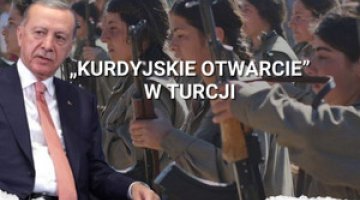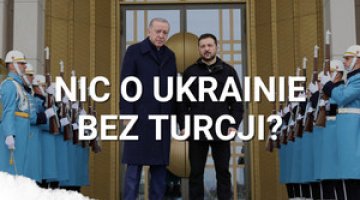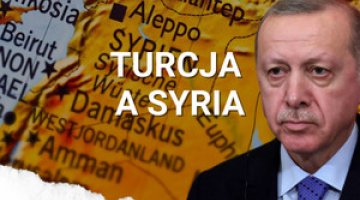A new chapter in Turkish-Iraqi relations?
On 22 April, Turkey’s president Recep Tayyip Erdoğan made his first official visit to Iraq since 2011. He was accompanied by ministers for foreign affairs, domestic affairs, defence, trade, transport & infrastructure and energy, as well as the head of the MIT intelligence agency, among other officials. In Baghdad, Erdoğan talked to President Abdul Latif Rashid and Prime Minister Muhammad Shia al-Sudani. Twenty-six bilateral agreements were signed, including cooperation on military (which cover combating the Kurdistan Workers’ Party [PKK], recognised by both states as a terrorist organisation); defence industries; along with partnerships in the fields of the economy, agriculture, technology, energy, media and water supply from Turkey to Iraq via the Tigris and Euphrates rivers.
The most important economic deal was the preliminary agreement regarding the “Development Road” infrastructure project; this was signed by the transport ministers of both countries and their counterparts from Qatar and the United Arab Emirates, who specifically travelled to Baghdad for this purpose. The project is aimed to connect Turkey with a 1200-kilometre-long rail and road route to the commercial ports on the southern coast of Iraq bordering Kuwait, and to transform Iraq into a transit hub capable of competing, for example, with the Suez Canal. The project is valued at $17 billion. Construction of the route will begin next year and is expected to be completed by 2029.
During a joint press conference with Prime Minister al-Sudani, the Turkish president expressed his approval for the Iraqi National Security Council’s decision to recognise the PKK as a “prohibited organisation” and said he hoped that its operation in the country would soon be put to an end. He declared full support for Baghdad in achieving this goal, and stated that this cooperation would enhance security, especially in the border areas of both countries.
Erdoğan’s second stop during his visit to Iraq was Erbil, the capital of the Kurdistan Region (KRG) located on the border with Turkey. During talks with the president and prime minister of the KRG, regional issues were discussed, including the need to eliminate the PKK’s terrorist activities. Erdoğan also urged the government in Erbil to improve relations with Baghdad as a foundation for their joint counterterrorism efforts. He emphasised that future economic cooperation with Iraq would also extend to the Kurdistan Region, and highlighted the desire to improve trade relations with it.
Commentary
- The relationship between Turkey and Iraq has been difficult for years due to a series of political and economic conflicts. Baghdad’s failure to combat the PKK-affiliated groups operating along the Kandil Mountains on the Iraqi-Iranian border and in the Gara region of northern Iraq is a particularly sensitive issue for Ankara. Turkey believes that this has forced its armed forces to launch frequent military operations (both ground and air) into Iraqi territory; Ankara claims that such manoeuvres are legitimised by the treaty which the two countries signed in 1995, and by bilateral agreements with the Kurdistan Regional Government (see Appendix for more details). Baghdad has firmly rejected these argumentations, deeming them outdated or illegal, and has accused Turkey of violating its territorial integrity and sovereignty. These problems have also led to complications in Ankara's relations with the KRG, which – despite good political relations with Turkey – has not succeeded in curbing the PKK’s activity in the Kurdistan Region.
- Another contentious issue is the transmission of Iraqi oil, which primarily originates from the KRG. Since 2014, Baghdad has accused Turkey of being involved in the KRG’s illegal sale of Iraqi crude oil, which has deprived the Baghdad government of a share of the revenue estimated at around $1.5 billion in total. This has led to a deterioration of relations between Irbil and Baghdad, as well as between Turkey and Iraq. Additionally, this matter was referred to the International Chamber of Commerce (ICC) for arbitration, which ordered Ankara to pay compensation to Iraq. The Turkish government completely halted the transport of Iraqi oil as part of its boycott of the ICC’s decisions. The oil pipeline, with a daily capacity of 1.6 million barrels, starts in Kirkuk, Iraq, and connects the fields in the Kurdistan Region with the Turkish export terminal in the city of Ceyhan on the Mediterranean Sea. Erdoğan’s visit to Iraq, preceded by the Turkish foreign minister’s trip to the country in March this year, was thus intended not only as an opportunity to improve bilateral relations and resolve the above-mentioned disputes, but also as a gauge of both sides’ willingness to reset their relationship.
- Both the discussions and the number of bilateral deals signed during the visit indicate that a political breakthrough is taking place in Turkish-Iraqi relations. That will likely open up the possibility of addressing the issue of combating the PKK-affiliated groups on Iraqi territory, which is a priority for Ankara. Turkey views this as a political success, and is a sign that it is ready to cooperate with Baghdad on many fronts – although this will likely strain its relations with the KRG. However, this does not mean that Ankara intends to abandon its ties with Erbil completely, as evidenced by the positive (albeit moderate) tone of Erdoğan’s visit to the Kurdistan Region.
- Ankara’s relations with Baghdad will be put to the test in the coming months. For Turkey the measure of success will be the real scope of cooperation with the Iraqi authorities in combating the PKK. A closer partnership between both states in this field may also help stabilise the region and create conditions for stepping up trade. This latter aspect will be particularly important in the implementation of the “Development Road” project, which will be economically beneficial to both Turkey and Iraq. This project has largely been financed by Gulf states which want to establish a land trade corridor as an alternative to maritime routes, including those running through the Red Sea.
- The visit has increased the feasibility of a large-scale military operation Ankara has announced against the PKK in northern Iraq (planned for this summer), which will likely encompass the Kurdistan Region and part of the Iraqi province of Nineveh. This operation’s aim would be to establish a security corridor controlled by the Turkish armed forces along the Turkish-Iraqi border (up to 40 kilometres deep into Iraqi territory). However, the tone of the meetings suggests that the operation would most likely be conducted with the consent of, and most likely in close coordination with, the Iraqi armed forces under Baghdad’s command. The expected military intervention will, after many decades, allow Turkey to significantly weaken the PKK groups in Iraq and curb their operation in Syria by disrupting their weapon supply network and the flow of individuals associated with the PKK.
- With improved relations between Turkey and Iraq, the issue of oil exports from the Kurdistan Region is more likely to be successfully addressed, although this will also require resolving the disputes between Erbil and Baghdad over revenue sharing. The closer Turkish-Iraqi ties may also undermine Iran’s influence in Iraq. Currently, Tehran is deeply involved in financing and training paramilitary groups in the country, and Baghdad is politically dependent on the Iranian government. Closer political and military ties between Iraq and Turkey could gradually change this power dynamic, reorienting Baghdad’s policy towards Ankara and the Arab world. However, in the current situation this scenario is quite unlikely, considering Iraq’s still strong political ties with Iran.
APPENDIX
Turkish military presence in Iraq so far
According to publicly available sources, the Turkish military presence in Iraq currently ranges from 5000 to 10,000 soldiers, although this data is difficult to verify. Turkish troops are stationed in the Kurdistan Region of Iraq and are deployed in 40 (according to the Turkish data for 2020) to 100 (according to the Iraqi data for 2022) military bases, most of which have been built after 2018. These bases have been established on the basis of agreements signed with the Kurdistan Regional Government. The government in Baghdad claims that the Turkish military presence in this region is illegal.





